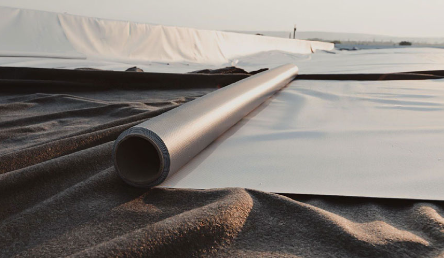- Understanding the Role of Geomembrane Liners in Waste Management
- Innovations in Geomembrane Liners for Water Management
- Geomembrane Liners: A Comprehensive Guide
- The Future of Geomembrane Liners in Civil Engineering
- Geomembrane Liners: Enhancing Landfill Stability
Manager:
WhatsApp:+86 177 0135 2670
Tel:+86 177 0135 2670
Email:marketing@okorder.com
Address:3rd Floor, No.2 Building, No.1 Sanlihe Road
What is a geomembrane used for?
Geomembranes are a special type of manufactured materials that serve numerous purposes in civil and environmental engineering. Among these, composite geomembranes and high-density polyethylene (HDPE) geomembranes can be singled out for their versatility and efficacy. In this article, we will take a look at the applications and uses of such types of geomembranes, thus showing how important they are in today’s construction and environment protection undertakings.

Definitions of Geomembranes
Geomembranes refer to thin sheets or membranes made from synthetic polymers. These materials possess some exceptional qualities including flexibility, impermeability, as well as chemical resistance which make them suitable for wide-range applications where containment and protection are crucial. The main role of geomembranes is to act as barriers to fluid or gas migration thereby preventing soil, water and air contamination.
Composite Geomembranes: Enhanced Performance and Versatility
Composite geomembranes are combination of different materials that help improve performance characteristics. They normally have several layers each with its own purpose. It allows for customization so as to make the properties of geomembrane specific for particular application requirements.
Landfill Liners and Caps
One common use of composite geomembranes is landfill engineering where they form liners as well as caps which create a barrier between waste materials and the surrounding environment. This helps keep leachate from reaching into the soils or groundwater hence reducing environmental risks associated with landfills by protecting ecosystems as well human health.
Mining and Containment Ponds
Containment ponds for mining operations also utilize composite geomemmbranes.Tailing storage facilities similarly employ such geommmbraness . These prevent harmful chemicals alongside heavy metals leaching into nearby soils/water bodies respectively.Moreover,they enhance stability plus reinforcement of containment structures that ensure safety while ensuring waste management practices within the mining sector are efficient.
Water & Wastewater Treatment
Water and wastewater treatment plants rely on composite geomembranes. They are used in holding basins, lagoons and secondary containment systems to curtail the release of contaminants and pollutants. By keeping them intact, these geomembranes preserve public health and prevent environment from stupor.
Environmental Remediation
Composite geomembranes are used for isolating and containing sites that have been contaminated during environmental remediation projects.Whether it is polluted soil or water beneath it , they form an impervious membrane preventing spreadage of pollutants as well as successful remediation efforts.These are essential items for restoration initiatives due to their durability and adaptability.
High Density Polyethylene Geomembranes: Strength & Durability
High-density polyethylene (HDPE) geomembranes are known for their strength, durability, and chemical resistance. hdpe Geomembranes made from high-quality resins perform better in challenging environmental conditions than others making them preferred for many applications.
Aquaculture Pond Liners
In aquaculture, HDPE geomembranes serve as pond liners to create safe containment system for fish and other aquatic organisms preventing seepage or contamination thus maintaining good water quality resulting into favorable breeding environment. In aquaculture applications, these HDPE geomembarane provides a long-lasting reliability through puncture resistance as well as UV stability.
Canal & Reservoir Linings
In order to reduce water loss by seepage, HDPEs have found extensive use in canal linings and reservoirs.These barriers save water resources hence increasing irrigation efficiency by keeping off any moisture from going outside its designated path.Their flexibility coupled with insensitivity to the nature makes them appropriate for large water storage facilities lining which provide dependable agricultural/industrial watersupplying purpose.
Stormwater Management
In stormwater management facilities, HDPE geomembranes are employed in detention basins, retention ponds, and stormwater channels. These membranes prevent pollutants from infiltrating the soil and water table, thereby minimizing contamination and flooding risks. They are essential components of sustainable urban drainage systems due to their high strength and ability to withstand hydraulic stresses.
Introduction
Gas Barrier Systems
HDPE geomembranes also find application in gas barrier systems for controlling migration of landfill gases such as methane and carbon dioxide. By encapsulating the waste with no escape routes for gases, these liners minimize environmental impacts ensuring compliance with regulations. Their impermeability as well as chemical resistance make them good barriers against hazardous gasses thus protecting both health of public and environment.

Conclusion
Composite geomembranes together with high-density polyethylene geomembranes form indispensable parts of contemporary construction projects, environmental conservation campaigns, or even managing resources optimally (Wolfe et al 102). These geomembranes provide suitable solutions to intricate engineering issues like containing toxic waste in landfills among other things or in aquaculture where water sources must be protected; they have versatile purposes for dealing with storm water runoffs. By demonstrating exceptional properties over time composite geosynthetic clay liners (C-GC’s) and HDPE Geomembranes have shaped civil-environmental engineering landscape making it more resilient towards climate change.”
-
2024-06-13Geomembrane is not plastic cloth






